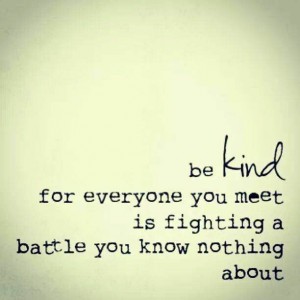The above sentence is both profound, practical, instructive, and chock full o’ brilliance. It was written by Wendy Mass, from her book, THE CANDYMAKERS. I haven’t read the book, but it was easy enough to Google the quote.
There is a fairly popularized proverb that I first saw in one of Rabbi Paysach Krohn’s “Magid” books that states the idea that if everyone’s “peckelach”–bags of troubles/challenges/heartaches-were hung out on a line for all to view and choose from, we would look at everyone else’s and then stick with our own “peckelach”.
So, the person you are sitting next to during your morning commute might look like they have their act together and are “living the dream, baby,” but they also might be dealing with a personal problem that we could never image dealing with. The person in front of you in shul might look like they are, mamesh, davening like they are in the Beis Hamikdash, but maybe they have trouble with something as “basic” as reading Hebrew and English fluently. The kid in you child’s class who always seems to get their teacher’s extra attention year after year after might
be subjugated to the most horrific family situation that you could ever imagine. The moreh who teaches your child in the mornings, has two other “part time” jobs in the afternoon (plus one on Sunday) and still manages to clean the house, help the kinder with their homework, make dinner every night, and lead a weekly Tehillim group might be hiding a secret that would ruin many lives. We just don’t know what others have to deal with.
This is especially important to think about as we end our year and enter into a new one surrounded by a series of days that, literally, can change our future.



I think that we need to take this one step further. Many people face challenges on a daily basis which can challenge their ability to maintain their kind face. Understanding that my situation is not the worst that their can be, helps up rationalize and maintain our kindness to other people. However, what about those that are unable to rationalize and maintain their kind demeanor? How are we supposed to approach them. This is when our ability to be kind and realize how difficult other people’s situations is even more important because it then when we are kind to those that are not kind to us, we are able to break the pattern of anger, and bring people back to the center. Think of all the arguments we could have avoided, with just a deep breath and a kind remark.
Marc, thanks for the comment. You are 100% right (said without a deep breath and kind remark).
It is much easier to say/type this, than to do. Rav Shlomo Wolbe zt’l use to tell his students that the home is the real test and battleground for tikun hamiddos. Being able to say a kind word to a stranger is way easier than doing it to someone close to us.